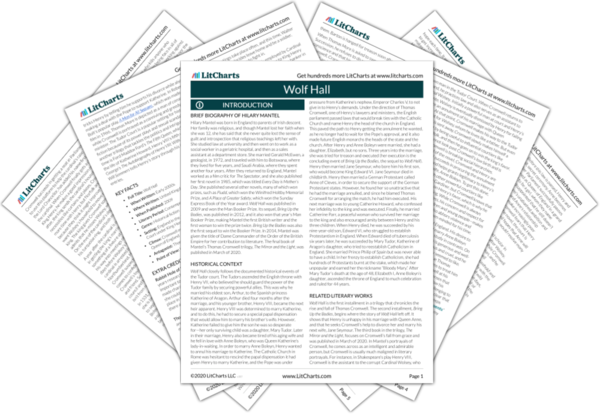Power, Ambition, and Deception
Wolf Hall is set in 16th-century England, at the time when King Henry VIII was trying to dissolve his marriage to Queen Katherine so he could marry Anne Boleyn. Since the Catholic Church believed that marriages were permanent, Henry couldn’t get a divorce. Unable to sway the Catholic Church, Henry broke away from it and declared himself head of the church in England. He did this with the help of his ambitious and canny…
read analysis of Power, Ambition, and DeceptionPoor Leadership and Violence
Thomas Cromwell, the protagonist of the historical novel Wolf Hall, lives most of his life with the threat of danger and violence, from his early childhood with his alcoholic and abusive father, to his time as minister in Henry VIII’s court. While the violence in these two settings seems very different on the surface—the intrigues of the Tudor court are subtler than the crude beatings that Cromwell was subject to at his…
read analysis of Poor Leadership and ViolenceChildren and Human Connection
In Wolf Hall, one of the main reasons that King Henry VIII wants to annul his marriage to Queen Katherine is because she hasn’t borne him a son—she has had multiple miscarriages and just one surviving daughter, and the king wants a wife who will give him an heir. The matter of the king’s heir drives the political tensions of the novel, and from this springboard, the novel delves into the relationships between fathers…
read analysis of Children and Human Connection
Dogmatism vs. Open-Mindedness
While Thomas Cromwell has to face many who oppose him, the character whom he crosses paths—and ideas—with most frequently is Thomas More, King Henry VIII’s Lord Chancellor. More’s uncompromising certainty in Catholic doctrine comes across as violent and deranged fanaticism. Cromwell, on the other hand, has a pragmatic and open attitude to ideas that are different from his own. In contrasting these two men, Mantel elevates open-mindedness over dogmatism and suggests that Cromwell’s…
read analysis of Dogmatism vs. Open-MindednessMyth and Storytelling
Wolf Hall is a historical novel in which the author has fleshed out historical facts and characters with her imagination—she has imagined their loves and fears, their motivations and conversations. The novel is an imagined history, and Mantel consciously draws attention to this fact by frequently alluding to storytelling, mythology, and the theater in the novel. By pointing out repeatedly that the characters are just that—characters—Mantel reminds readers that Wolf Hall is just one version…
read analysis of Myth and Storytelling






